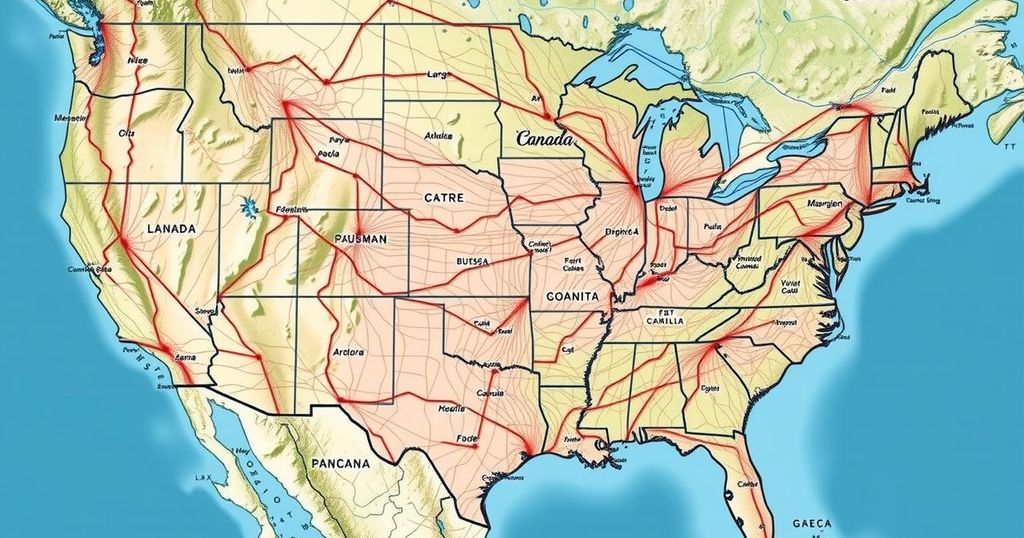World news
ALASKA, AMERICA, ARIZONA, ASIA, ATLANTIC, BIDEN ADMINISTRATION, CANADA, CNN, CNN POLITICS, DONALD TRUMP, EUROPE, EUROPE/ASIA, FENTANYL LABS, GREENLAND, LOUISIANA, LOUISIANA PURCHASE, MEXICO, NATIONAL SECURITY, NORTH AMERICA, PACIFIC, PANAMA, PANAMA CANAL, PHILIPPINES, POLITICS, RUSSIA, TRUMP, TRUMP ADMINISTRATION, U.S. ELECTIONS, UNITED STATES, US
Lena Nguyen
0 Comments
Trump Teases American Expansionism with Panama, Greenland, and Canada
President-elect Donald Trump has hinted at expanding U.S. territory into Canada, Panama, and Greenland, evoking themes similar to 19th-century Manifest Destiny. His comments reflect a blend of policy proposal and rhetoric. International reactions include firm rejection from leaders of affected nations, highlighting the potential impact of Trump’s statements on future diplomatic relations and foreign policy direction.
In recent statements, President-elect Donald Trump has sparked discussions surrounding the potential territorial expansion of the United States into regions such as Canada, Panama, and Greenland. He provocatively suggested that Canada could become the 51st state, threatened to take control of the Panama Canal, and reiterated his desire to acquire Greenland. Trump’s remarks blur the line between serious policy proposals and attention-grabbing rhetoric, embodying a perspective reminiscent of 19th-century Manifest Destiny, a concept promoting the U.S. expansion across North America.
During a recent gathering in Arizona, Trump expressed that acquiring Greenland is vital for national security and emphasized the importance of the Panama Canal, despite the U.S. relinquishing control in 1999. He has also threatened military action against drug cartels, which could infringe upon Mexico’s sovereignty and fray diplomatic relations. His transition team has refrained from clarifying the seriousness of these ambitions, with close associates suggesting these ideas may emerge from discussions with allies at his estate.
Trump’s comments regarding Panama have elicited strong reactions, including a rebuttal from Panama’s President, who asserted the canal’s ownership was “not negotiable”. Similarly, the leaders from Greenland and Denmark have rejected Trump’s overtures regarding the purchase of their territories. The proposal to annex Canada has appeared more as a jest rather than a concrete diplomatic strategy, serving as a way to engage in dialogue with Canadian Prime Minister Justin Trudeau, particularly in the context of trade negotiations.
Despite some of the whimsical nature of his comments, the underlying themes indicate a broader inclination towards an assertive nationalistic agenda, one that seems to privilege American interests above all else. Trump’s rhetoric continues to ignite discussions about U.S. territorial ambitions and foreign policy direction, evoking nostalgia for an era of aggressive American expansionism.
As Trump prepares to assume office, the ramifications of his statements can affect U.S. relations with these nations, indicating a potentially tumultuous diplomatic landscape ahead. Such ambitions may not only evoke historical precedents of territorial acquisition but also challenge established international agreements and sentiments.
The article discusses President-elect Donald Trump’s comments regarding American territorial expansion, reflecting on his remarks about Canada, the Panama Canal, and Greenland. As he prepares to take office, Trump’s rhetoric appears to suggest a shift towards a more nationalist agenda, reminiscent of historical policies like Manifest Destiny that justified U.S. territorial expansion in the past. This backdrop provides context for the potential ramifications of Trump’s statements on international relations and America’s foreign policy.
In conclusion, while President-elect Trump’s remarks regarding the potential annexation of Canada, the assertion of control over the Panama Canal, and the desire to acquire Greenland may seem provocative and tongue-in-cheek, they reveal an underlying nationalist sentiment that could reshape U.S. foreign policy. The responses from foreign leaders and the implications of such statements warrant attention, as they may lead to significant diplomatic tensions and challenges ahead. Trump’s tenure may thus be characterized by a bold push for an expanded American presence in global affairs, reminiscent of a historical quest for territory and influence.
Original Source: www.cnn.com




Post Comment